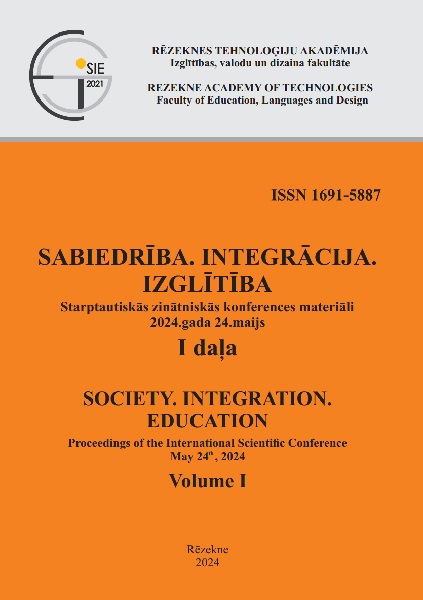EXPLORING THE CONTENT AND STRUCTURE OF FUTURE PRIMARY SCHOOL TEACHERS' EMOTIONAL INTELLIGENCE
DOI:
https://doi.org/10.17770/sie2024vol1.7914Keywords:
emotional awareness, emotional intelligence, empathy, future primary school teacher, managing social relationships, New Ukrainian school, primary school, professional training, personal motivation, self-motivationAbstract
The aim of the present study is the theoretical justification and empirical research of the emotional intelligence level of students speciality "Primary Education", the disclosure of pedagogical conditions for the development of emotional intelligence of future primary school teachers in the process of their professional training in a higher education institution.
The theoretical and experimental research was conducted during 2021-2023 on the basis of the Faculty of Psychology and Pedagogy of the Mariupol State University. It performed two main tasks: 1) determination of the emotional intelligence development level of future primary school teachers, in particular in the context of their professional training; 2) justification of effective pedagogical conditions for the development of emotional intelligence in future primary school teachers.
The article describes the biological, social and pedagogical factors of the development of emotional intelligence. The principles of organizing the process of developing emotional intelligence in a higher education institution are considered: the principle of activity, contextuality, systematicity, and the principle of emotional variability. The analysis of empirical data obtained within the framework of the conducted research is given.
References
Doroshkevych, D., & Ilyash, O. (2020). The Investigation of Emotional Intelligence Level in Non-Government Organization with The Use of Hall’s Test. У International Scientific Researches Congress 2020 Gümüşhane (с. 5–23). https://kutuphane.gumushane.edu.tr/media/uploads/kutuphane/files/uluslararas-bilimsel-arastrmalar-kongresi-2020-gumushane.pdf
Goleman, D. (2011). The brain and emotional intelligence: New insights. Northampton MA: More than sound. Retrieved from: https://impactconnect.com.ng/wp-content/uploads/2023/06/The_Brain_and_Emotional_Intelligence-Daniel_Goleman.pdf
Kabinet ministriv Ukraini. (2018). Pro zatverdzhennya Derzhavnoho standartu pochatkovoyi osvity [On the approval of the State Standard of Primary Education]. Retrieved from: https://zakon.rada.gov.ua/laws/show/87-2018-п#Text
Khadzhynova, I. (2022). Robocha prohrama z navchal"noyi dyscypliny «Emocijnyj intelekt v osviti» dlya studentiv osvitn"oho stupenya «Bakalavr» za napryamom pidhotovky 01 Osvita special"nosti 013 Pochatkova osvita. MDU.
Khadzhynova, I. (2024). Rozvytok emocijnoho intelektu majbutnix vchyteliv pochatkovoyi shkoly [Pidrozd. 2.5]. Naukovo-metodychnyj suprovid profesijnoyi pidhotovky pedahohichnyx kadriv ta kerivnyx kadriv dlya Novoyi ukrayins"koyi shkoly (s. 188–210). MDU. http://repository.mu.edu.ua/jspui/handle/123456789/5133
Mayer, J. D., DiPaolo, M., & Salovay, P. (1990). Perceiving Affective Content in Ambiguous Visual Stimuli: A Component of Emotional Intelligence, Journal of Personality Assessment, 54(3-4), 1990, 772-781, DOI: https://doi.org/10.1080/00223891.1990.9674037
Nosenko, E., & Chetveryk-Burchak, L. (2014). Posibnyk do vyvchennya kursu «Teoriya emocijnoho intelektu». Dnipropetrovs"k.
Shpak, M. (2021). Psychological peculiarities of the development of emotional intelligence in student’s age. Pedagogical and psychological science and education: transformation and development vectors: collective monograph. Riga, Latvia, 342-359.
Suxopara, I. (2019). Chynnyky rozvytku emocijnoho intelektu molodshyx shkolyariv u konteksti novoyi ukrayins"koyi shkoly Naukovyj visnyk MNU imeni V. O. Suxomlyns"koho. Pedahohichni nauky, 2 (65). 296-301.
Veritova, O. (2019). Rozvytok emocijnoho intelektu majbutnix pedahohiv vyshhoyi shkoly v procesi mahisters"koyi pidhotovky: dys. ... kand. ped. nauk: 13.00.04. Zaporizhzhya.
Verkhovna Rada of Ukraine. (2020). Profesijnyj standart za profesiyeyu «Vchytel" pochatkovyx klasiv zakladu zahal"noyi seredn"oyi osvity». Retrieved from: https://zakon.rada.gov.ua/rada/show/v2736915-20?lang=en#Text
Zadorozhna-Knyagnitska, L., Hadzhinova, I. (2021). Development of primary students’ emotional intelligence: analysis of foreign experience. Porivnyal"na profesijna pedahohika. 11(2), 48–54. Retrieved from: http://repository.mdu.in.ua/jspui/handle/123456789/4671
Zarycka, V. (2013). Psyxolohiya rozvytku emocijnoho intelektu u systemi profesijnoyi pidhotovky faxivciv humanitarnoho profilyu: dys. … d-ra psyxol. nauk: 19.00.07. Zaporizhzhya.






